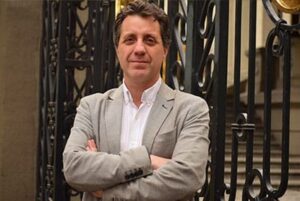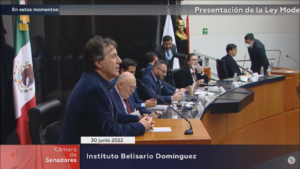Faced with challenges and the increase in violence against journalists in Latin America, two South American journalists are promoting a Model Law that could be applied worldwide. So far, Chile is the country that has made the most progress in this regard. On March 6, 2023, the Cultur-e, Arts and Communications Commission of the Chamber of Deputies of that country approved the bill for the protection of journalists and communications workers. This is a first step so that the entire Chamber of Deputies can approve the bill, which will then pass on to the Senate.
In this context, local media recalled the murder of Chilean journalist Francisca Sandoval while she was covering a Workers' Day march in Santiago de Chile, on May 1, 2022.

Mauricio Weibel, Chilean journalist, co-author with Ricardo Rivas of the draft bill for the Model Law for the Protection of Journalists, which could be applied worldwide. (Credit: Courtesy)
"From 1990 to the present, in the world, more than 2,500 journalists have been killed because of their work. In the last five years, 400 journalists have been killed," Mauricio Weibel told Latam Journalism Review (LJR). Last year was "one of the worst in history."
The Chilean journalist, together with his Argentinean colleague Ricardo Rivas, has been promoting the "Model Law for the Protection of Journalists and Communications Workers" since 2020. This is an unprecedented initiative that seeks to create a "global mechanism for the protection of journalists." In addition, it requires the State to guarantee rights such as freedom of the press and of expression, access to information, and democratic governance.
This Model Law, created with the support of the Heinrich Boll Foundation and Unesco, was finalized at a meeting with media and journalists from the region in the city of Montevideo in 2021, and with the presence of the Special Rapporteur for Freedom of Expression, of the Inter-American Commission on Human Rights (IACHR) Pedro Vaca. "We began to build an inter-American legal framework that will allow us to advance in national legal frameworks for the protection of journalists," Weibel said.
To better explain this initiative, Weibel added: "There is no inter-American law for the protection of journalists either in Latin America or in the world, as was the case for the Model Law on access to information. A Model Law on access to information was created for the Inter-American system and that [model law] was downloaded to the countries. Each country created its own law according to its historical, cultural and political specificities."
Through the Model Law, States must establish a preventive approach, identify contexts and situations of risk, and establish early warning mechanisms. As well as establishing safety measures for journalists and press workers, and facilitating the practice of their profession.
Although there are protection mechanisms for journalists in countries such as Colombia or Mexico, "there is still no law that takes into consideration all these elements," Weibel said. That is why the Model Law incorporates "all the jurisprudence of the Inter-American Court of Human Rights and all the advances that have taken place in other international justice systems."
The Model Law "includes journalists as human rights defenders, and includes physical violence and online violence," the journalist said. In addition to seeking to sanction crimes against journalists, it seeks to establish "due diligence, and includes a gender perspective that establishes a protection mechanism against attacks directed specifically at women."
"Basically, this law establishes a legal standard for human rights with respect to the protection of journalists," Weibel said. He emphasized that this is an initiative created from Latin America to the world, because attacks on the press "are not just our problem, they are seen all over the world. It’s humanity’s problem.
For the promoter of the initiative, work must be tackled in three areas: At the level of the multilateral system, at the global level and at the country level. He admits there are countries in which it is very difficult to apply a law of this type because of the structural violence they have.
For example, "if there are attacks on women journalists in Iran, a protection mechanism should allow them to seek asylum in countries where they will not be attacked or where they will be protected by the European Union or the United Nations. We cannot continue having murders of journalists, and for that we need multilateral international organizations willing to take that step," he said.
The spirit of the Model Law is that of a "collective project," Weibel said. According to him, the objective is for all journalists in the world to work towards the protection required by the profession. That is the main challenge, to generate alliances with professional organizations in each country. The journalist adds: "It is not a question of us setting up the project and doing everything. For this to work, journalists in each country are the ones who have to set up the project, exert pressure and oversee it."

Mauricio Weibel, Chilean journalist, presenting the Model Law for the Protection of Journalists before the Mexican Senate on June 30, 2022. (Credit: Screenshot)
In addition to the legal progress of the project in Chile — the country where, as a result of the social outburst of 2019, attacks against the press increased —, the Model Law was already presented in Mexico’s Senate in the presence of Weibel and Rivas. In Paraguay, a draft bill on the safety of journalists will be submitted to Congress on April 26.
Weibel also recognizes the work being done on the Model Law by the Brazilian Association of Investigative Journalism (Abraji, by its Portuguese acronym): "We are in touch, we share ideas, we work together, but they are responsible for the project in their country."
Another challenge identified by the creators of the Model Law is that each country has its own uniqueness. According to Weibel: "It is not the same to create a protection mechanism for journalists in Colombia as in Uruguay. In Colombia, there are 400 people who have access to armored cars through the Colombian protection mechanism, but in Uruguay they would not think of that."
Mauricio Weibel, together with Rivas, directs the Latin American School of Journalism. He is an investigative journalist who specializes in civil and military corruption. Since 2012, he has been investigating corruption in the highest ranks of the Chilean army, for which he and his family have been victims of espionage, persecution and intimidation by the State.
Weibel believes that protection should extend to the families of journalists. Also, they intend to reach as many countries as possible with the Model Law initiative. Even if it takes years.
"The defense of freedom of expression and of the journalists who exercise it professionally is a defense of democracy and civilization," Weibel said. "Freedom of expression, of all human rights, is the most important one, because it is the one that allows us to demand all other rights, including the right to life. Society has the obligation to protect journalists."
--
Contributor Florencia Pagola is a freelance journalist from Uruguay. She does research and writes about human rights and freedom of speech in Latin America